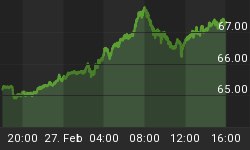Investors and market strategists are excited about the rallies in equities and economically sensitive commodities, but the declines in gold and Treasury yields are likely warning of deflation. Coincidentally, a similar scenario existed in July 2008 when investors embraced equities even though a stock market crash was directly ahead.
In July 2008, a Lehman Brothers report about Fannie Mae and Freddie Mac contributed to an equity market panic (link), but that panic turned into a short-covering rally that lasted through the beginning of August 2008. During that rally, investors embraced equities because it was believed that Hank Paulson's "bazooka" (link) and other government action would protect the economy and financial markets. However, gold and 10-year Treasury yields did not confirm the rally in equities; rather, they signaled that liquidity was tightening and that financial markets were under significant stress (Figure 1).
Figure 1. 2H08 Relative Values of Gold, S&P 500 and 10-Year Treasury Yield
Source: Yahoo! Finance, Continental Capital Advisors
In hindsight, the market's crash in the fall of 2008 seems as though it should have been expected, yet equity investors completely ignored the deflationary signals that existed during the preceding summer. In a repeat of 2008, gold and Treasury yields have recently declined as equities rose (Figure 2). We think investors again are ignoring obvious deflationary signals because they are hoping that future moves by the Federal Reserve will bolster asset markets.
Figure 2. Relative Values of Gold, S&P 500 and 10-Year Treasury Yield Since June 15, 2010

Source: Yahoo! Finance, Continental Capital Advisors
Economic statistics are significantly weaker than they were in July 2008 even though the government has spent trillions and the Federal Reserve has already cut interest rates to 0% as well as bought over a trillion dollars worth of assets. Additionally, the 10-year Treasury yield below 3% and gold's decline indicates deflation and liquidity strains. Consequently, the stock market today poses as great of a risk as it did during the summer of 2008.















